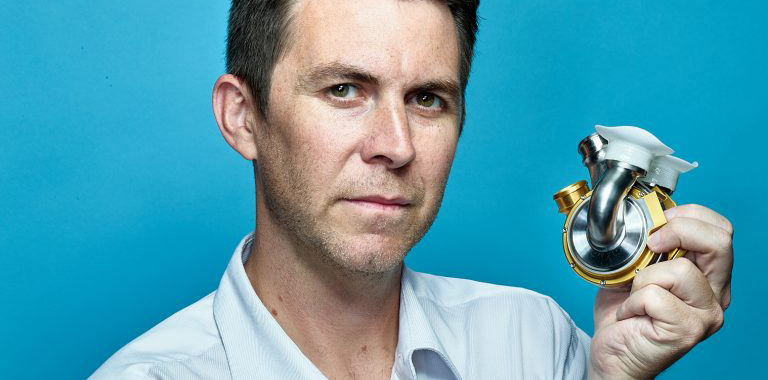Daniel Timms’ BiVACOR and partners have three devices green-lit by the MRFF.
Brisbane-founded artificial heart developer BiVACOR and partners have won a massive $50 million MRFF grant to develop and commercialise a suite of revolutionary and implantable cardiac devices that, for the first time, will offer longer-term solutions for all types of debilitating heart failure.
The grant, the third-largest ever awarded by the MRFF, will power the Artificial Heart Frontiers Program, a transdisciplinary consortium led by BiVACOR in partnership with Monash University, the University of Sydney, UNSW, Griffith University, the University of Queensland, The Alfred, Baker Heart and Diabetes Institute, and St Vincent’s Health Australia.
The devices to be developed and commercialised include:
- a wholly new miniature device, the Mini-Pump, which is implanted inside the hearts of patients who currently have no other option for treating their heart failure symptoms;
- a new type of left ventricle assist device (LVAD), which is implanted next to a natural heart to help it pump; and
- the Australia-US based BiVACOR’s Total Artificial Heart (TAH), which fully replaces a natural heart.
BiVACOR founder and CTO Dr Daniel Timms invented the world’s first TAH, which is currently being tested for trials in patients. Dr Timms said the consortium was a unique opportunity to bring together life-changing innovation and product development under the strong governance and support of Australia’s pre-eminent research institutions.
“The Frontiers Project brings together an unrivalled team of world-renowned clinicians and engineers with the resources of leading universities and hospitals to focus on bettering the lives of people living with heart failure and creating a long-term, vibrant industry here in Australia,” he said.
All three devices use technologies that will allow them to mimic a natural heart by automatically responding to the body’s physical demands, offering heart failure patients a treatment that helps to keep them active.
Current devices operate with a relatively fixed blood flow rate (or pump speed) that significantly curtails activity by leaving patients out of breath.
The MRFF funding will support future clinical trials at The Alfred in Melbourne and St Vincent’s Hospital Sydney.
By 2036 the project is expected to have generated a $1.8 billion benefit to Australia, including savings to the healthcare system, an expansion in local industry in research and manufacturing, the creation of more than 2000 jobs, and providing Australians early access to clinical trials and emerging life-saving technologies.
“Heart failure is a chronic progressive condition in which patients suffer from debilitating symptoms including persistent breathlessness and fatigue, that frequently require hospitalisation at great cost to a patient’s quality of life and the health system,” said project co-lead and director of cardiology at The Alfred, Professor David Kaye.
“The average survival of a heart failure patient is comparable to some cancers at just five years, and is even less for patients with advanced heart failure, who are the people our devices will most benefit,” said Professor Kaye, who also leads the Monash Alfred Baker Centre for Cardiovascular Research.
“By providing for the first time an automatic physiological response, these devices will significantly improve the quality of life of patients, allowing them to complete standard daily activities without shortness of breath.”


